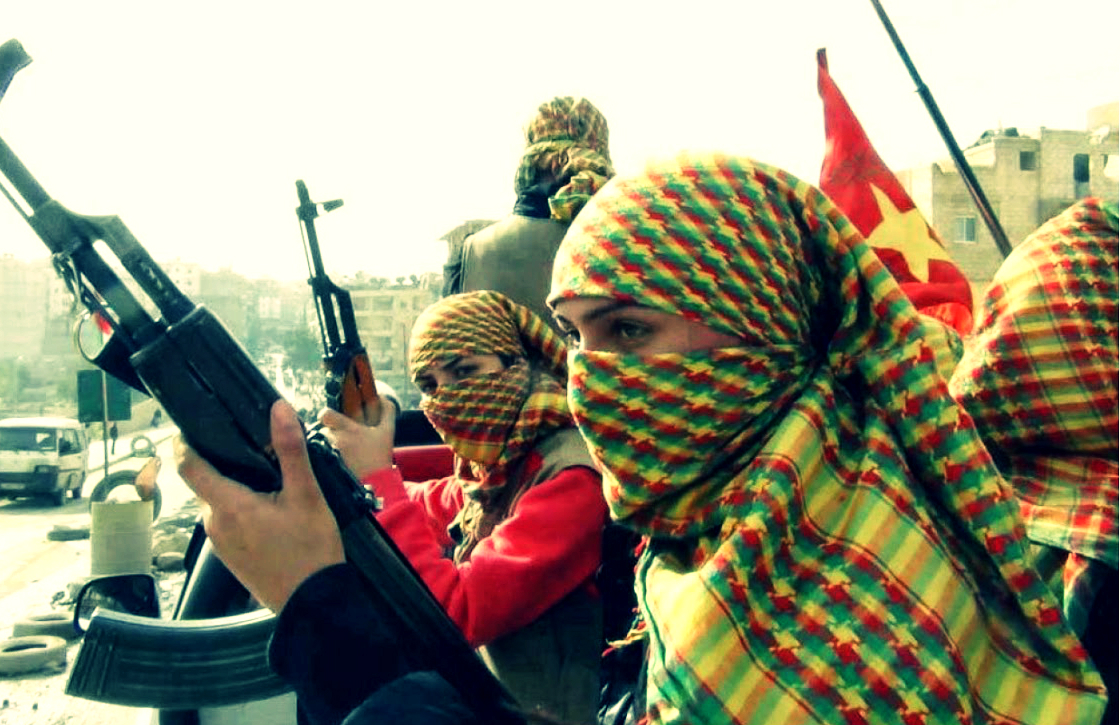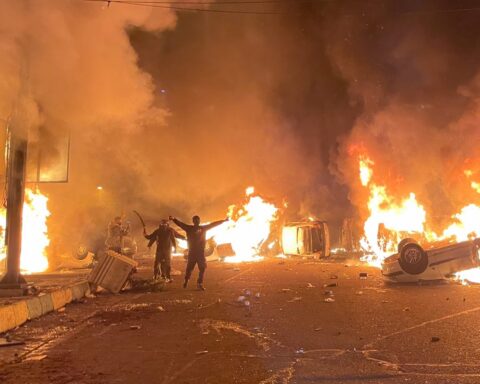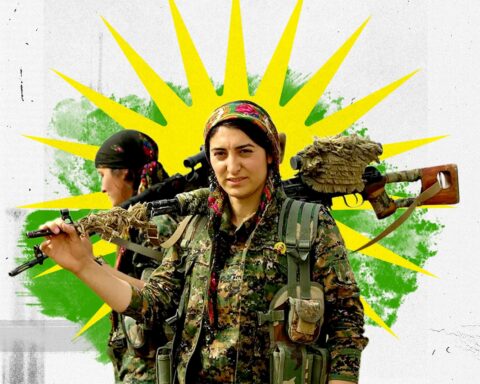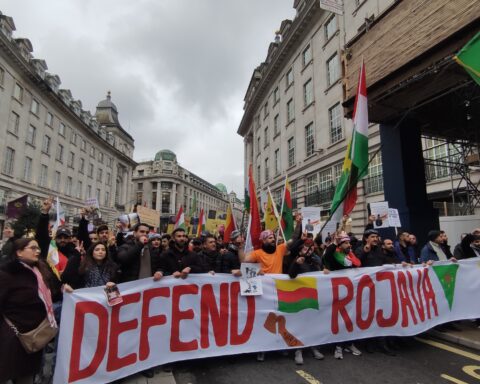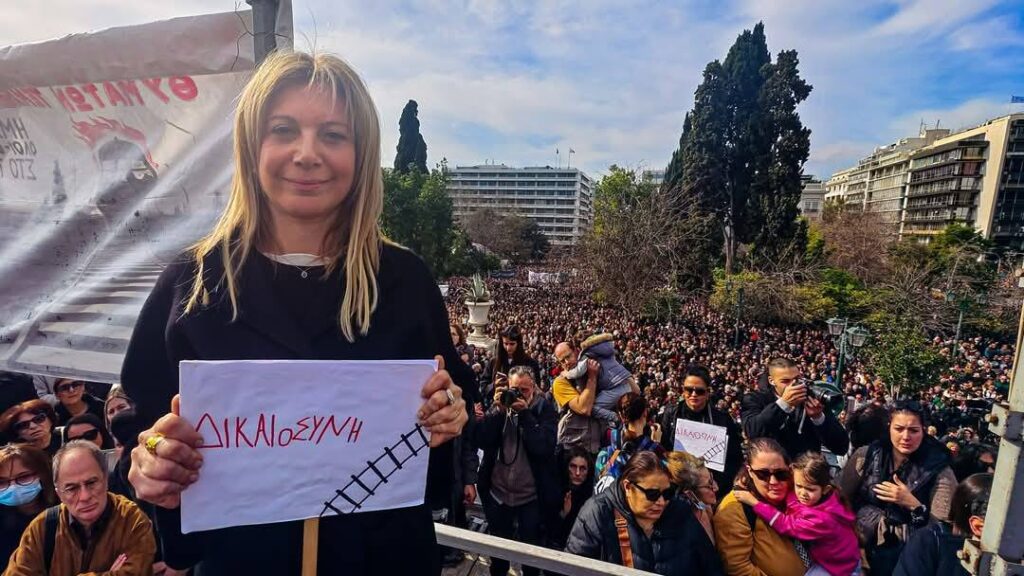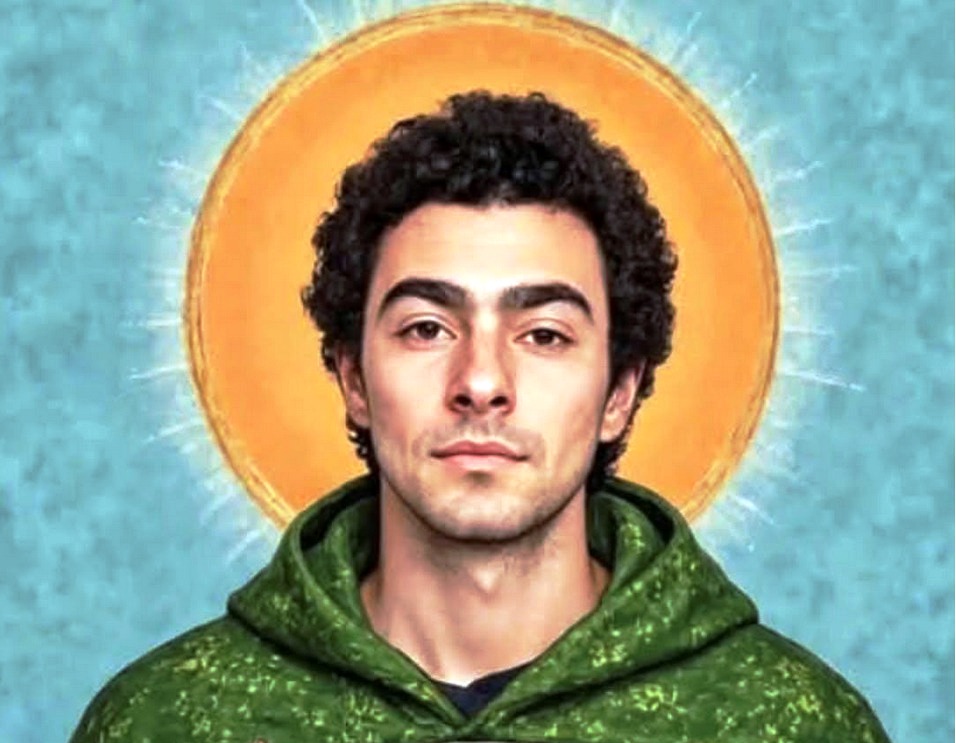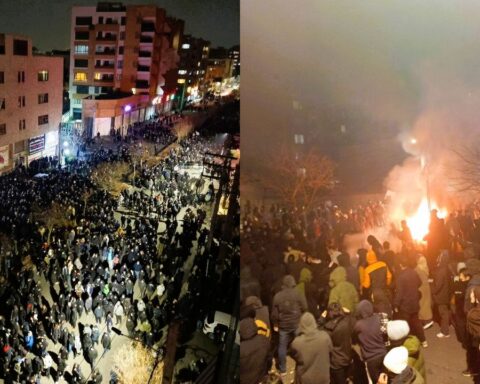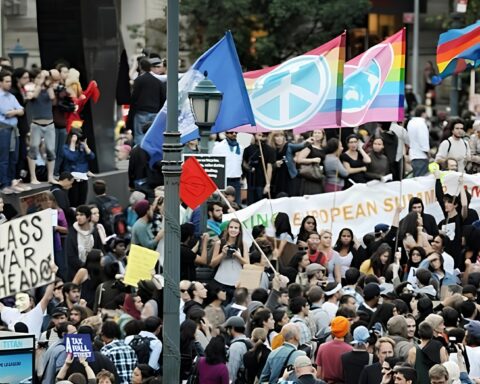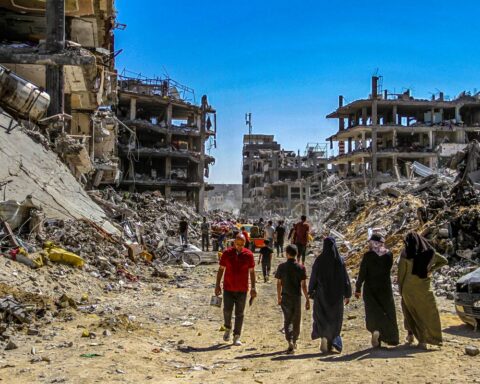The resilience of the Kurdish people who fight for their survival and autonomy serves as a testament to the enduring battle against colonialism, fundamentalism, and authoritarianism in this region and across the globe.
written by Blade Runner
Various parts of the article have been published before in Freedom News.
—
The battle for Tishrin Dam in Syria
For almost two months, Tishrin Dam, a vital infrastructure for water and electricity in northeastern Syria, has been subjected to continuous drone and warplane attacks. The likelihood of a catastrophic failure grows each day, and if the dam collapses, it could release approximately 2 billion cubic meters of floodwater, causing widespread destruction to villages, farmland, and lives downstream. Beyond the immediate humanitarian crisis, this would significantly threaten Rojava’s revolutionary project.
On January 8, thousands gathered to create a human shield in defence of the dam. Ongoing drone strikes have already resulted in 25 deaths and numerous injuries, including journalists. Despite the relentless attacks, vigils persist as convoys of supporters have been arriving from various parts of northern Syria. The damaged yet still-standing dam has become a powerful symbol of Rojava’s resistance, inspiring solidarity actions worldwide.
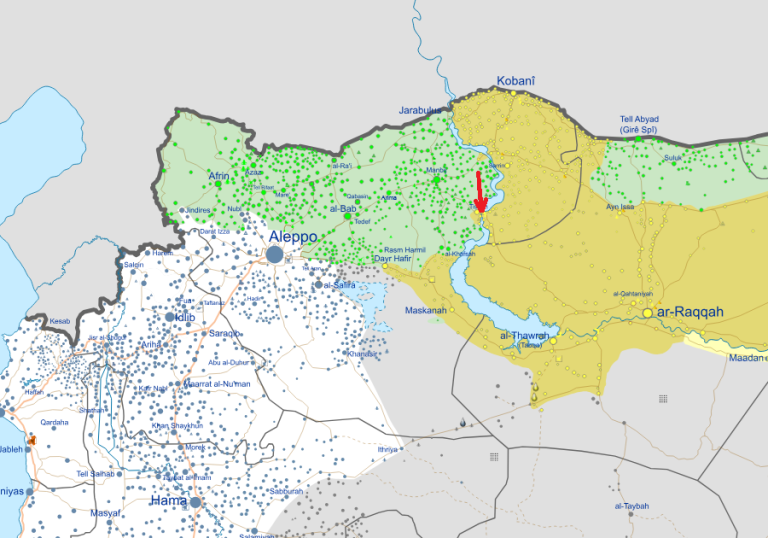
Tishrin Dam is not only a crucial source of water and electricity but also a strategic gateway between contested territories. To the east, it links areas controlled by the Kurdish-led Syrian Democratic Forces (SDF), who are resisting attacks by the Turkish-backed former ISIS group, the Syrian National Army (SNA)—a militia infamous for looting, robbery, and kidnappings. Supported by Turkish artillery, drones, and fighter jets, the SNA’s offensive on the dam is part of a larger strategy: the assault on Kobani, a key centre of Rojava’s resistance against the Islamic State (ISIS). This renewed aggression seeks to dismantle the autonomous Kurdish-led region.
In recent developments, the Turkish-backed offensive has escalated—a pumping station has been damaged, leaving over 200,000 people without drinking water. This follows weeks of shelling of villages in the countryside area south of Kobani, as the aggressors continue to spread terror in an effort to break the resistance.
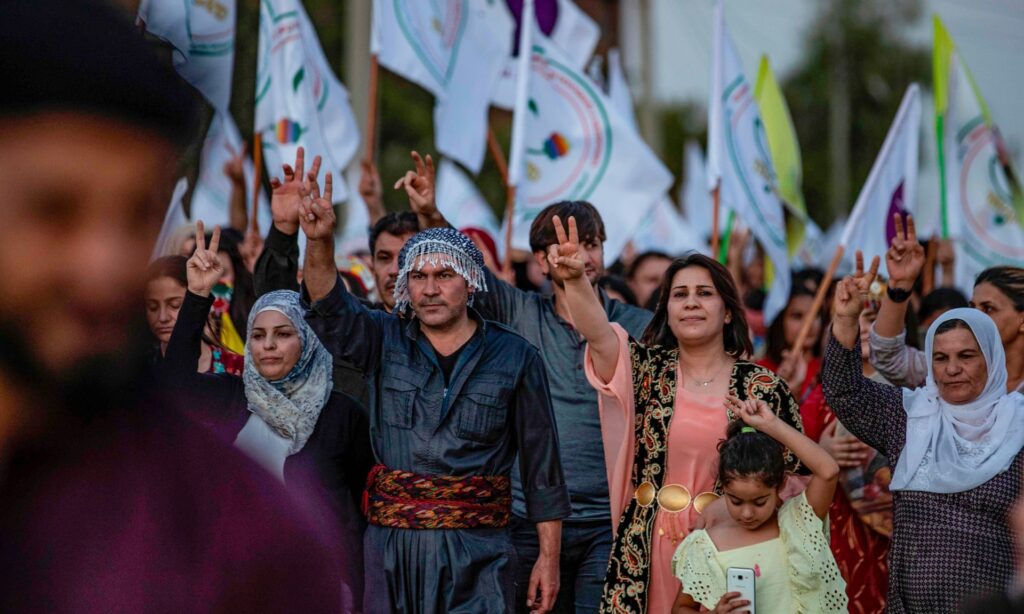
Brief history of Rojava’s radical self-governance experiment
The Arab Spring of 2011 was part of a larger global wave of uprisings, beginning with the Zapatista movement in the 1990s, and sparked mass protests across the Arab world. In Syria, governed since 1963 by the Ba’ath party, a political movement blending secular Arab nationalism and Arab socialism that evolved into a family loyalist dictatorship, the initial uprising quickly escalated into a full-scale revolution and civil war. In the northeast, the Kurdish population seized the opportunity to launch their own autonomy project in the Rojava region.
The Kurds are a stateless nation, numbering around 30-45 million people today, and have lived since the Neolithic era scattered across regions currently controlled by Turkey, Iran, Iraq, and Syria. With a long history of struggles for independence and social justice, the Kurdish movement in Rojava (the Syrian part of Kurdistan) formed an alliance with Arabs, Assyrians, and Turkmen, creating the Democratic Autonomous Administration of Northern and Eastern Syria (DAANES).
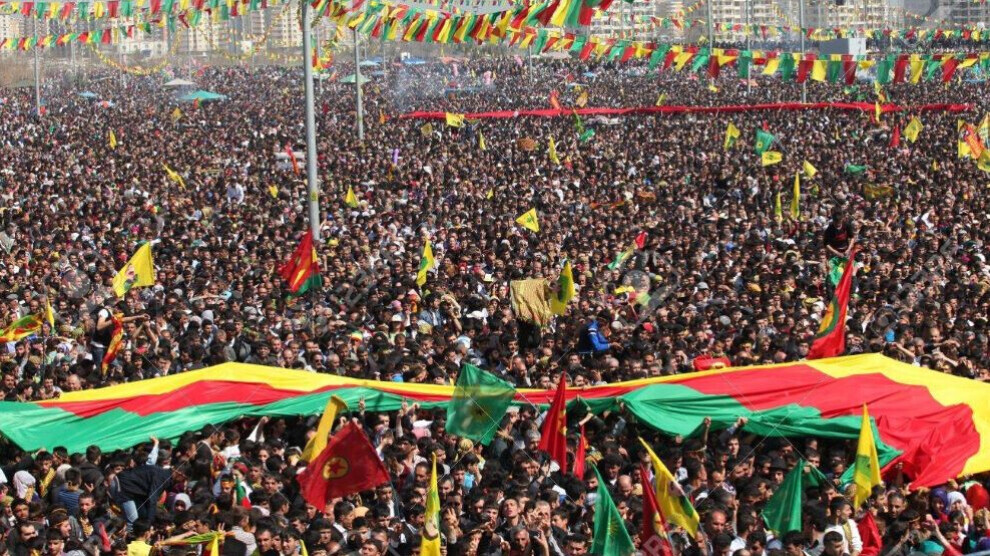
This marked the onset of the Rojava social revolution, a movement aligned with the revolutionary ideology of Abdullah Öcalan, the imprisoned founder and ideological leader of the Kurdistan Workers’ Party (PKK), the Kurdish political organisation that has been fighting for Kurdish autonomy within Turkey. Öcalan, during his imprisonment in Turkey shifted away from Marxist-Leninist nationalism to a form of libertarian socialism known as democratic confederalism.
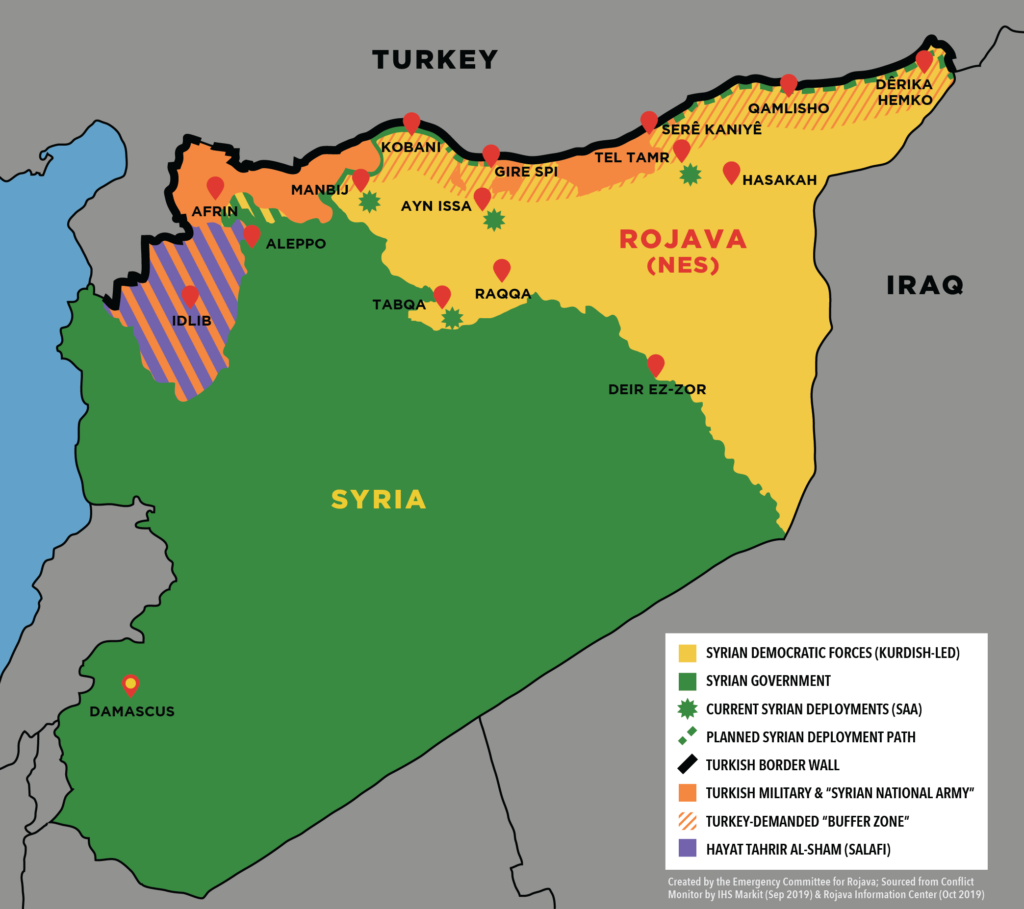
Rojava’s project is grounded in decentralisation, gender equality, and direct democracy. These principles have led many to idealise Rojava as an anarchist or anti-capitalist utopia. However, it remains a complex endeavour: while it rejects the centralised state model, it retains certain government structures, such as prisons, and continues to engage in trade and monetary exchange. In Rojava, there are some of the most fertile lands in Syria as well as significant oil fields, the exploitation of which has been one of the main sources of revenue.
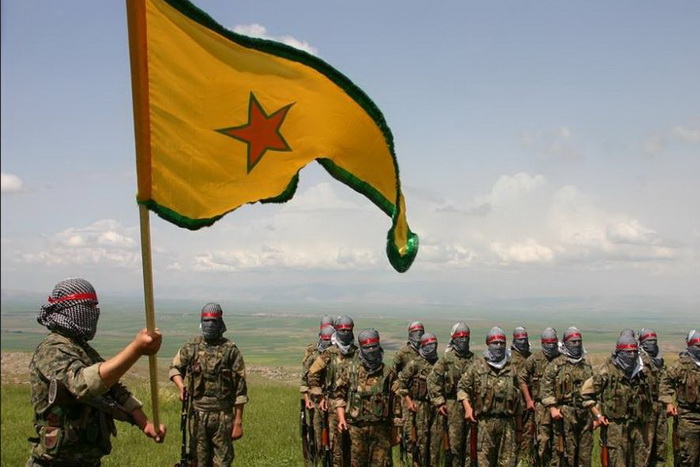
The military forces defending Rojava include the Kurdish liberation militias of the People’s Protection Units (Yekîneyên Parastina Gel, YPG) and Women’s Protection Units (Yekîneyên Parastina Jin, YPJ). These were the primary forces that halted the advance of the Islamic State (ISIS or ISIL) early in the Syrian civil war, safeguarding an autonomous Rojava and allowing the revolutionary experience of democratic confederalism to develop.
YPG and YPJ led the formation of the SDF, a coalition of military and political organisations of which they are the largest. The SDF have increasingly relied on military and political support from the US, entering into realpolitik compromises that have limited the spread and development of the Rojava revolution and its potential for global revolutionary solidarity.
The Kurdish movement remains in tension between the historically entrenched authoritarian Marxist currents that constitute the old guard of the PKK and the anti-authoritarian current developed by Öcalan, as well as the women’s organisations, local communes, and much of the younger generation. Nonetheless, SDF-controlled areas remain by far the safest for women, ethnic minorities like the Yazidi, and atheists and religious minorities.
In Syrian Kurdistan the people were prepared and knew what they wanted. They believed that the revolution must start from the bottom of society and not from the top. It must be a social, cultural and educational as well as political revolution. It must be against the state, power and authority. It must be people in the communities who have the final decision-making responsibilities. These are the four principles of the Movement of the Democracy Society.1
Radical leftists and anarchists who have travelled to Rojava—whether to fight alongside the local forces or to volunteer in communities—view it as a significant experiment in self-organisation. People from diverse backgrounds, including Kurds, Arabs, Assyrians, Muslims, Christians, and Yazidis, have worked together in solidarity. The region is structured through a federation of towns and cantons, where local communes, councils, and committees manage governance at all levels.
Rojava’s revolution has significantly transformed society. Women hold leadership positions in governance, the military, and civil institutions. Ethnic and religious minorities enjoy greater protections and representation than in surrounding states. While challenges and contradictions persist, Rojava’s model stands as an alternative to the authoritarianism, sectarianism, and capitalism prevalent in the region.
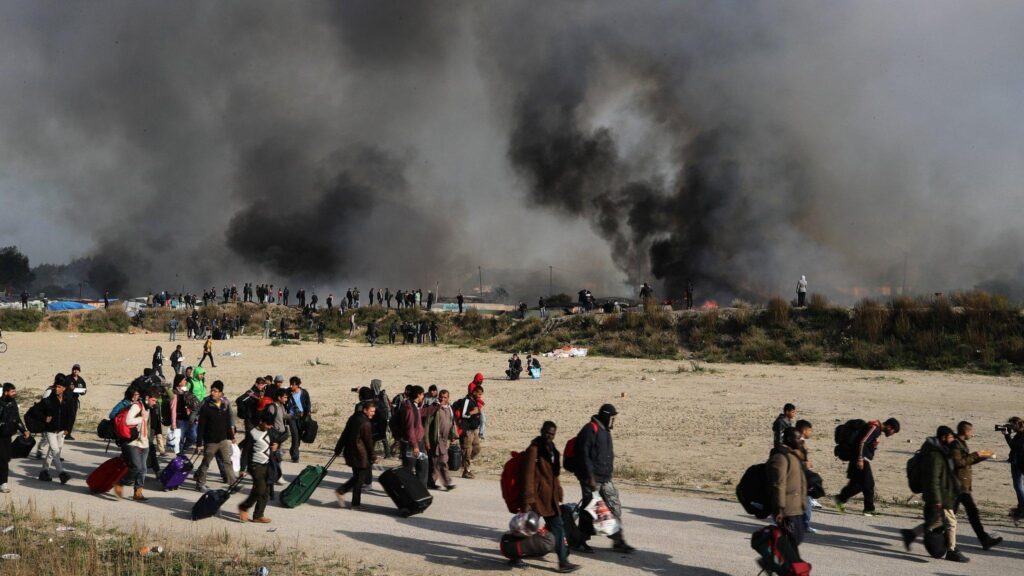
How the Middle East crisis entered its new phase and the re-ignition of the Syrian war
On October 7, 2023, Hamas launched a surprise offensive against Israel. Despite millions invested in surveillance technology, settlement expansion, and the construction of a massive separation wall, the Israeli state was caught off guard. In response, Israel has waged over a year of genocidal warfare against the people of Gaza while escalating a US-backed proxy war against Iranian-aligned forces, to secure regional dominance.
Both Israel and Iran have framed their aggression in nationalist and religious terms, justifying military operations as necessary for national security and ideological preservation. Israeli leadership has openly declared its intention to reshape the Middle East by neutralising regional adversaries while advancing a doctrine of Jewish supremacy. Meanwhile, Iran presents the conflict as a “holy war against the forces of evil,” using it to consolidate regional influence with support from China and Russia.
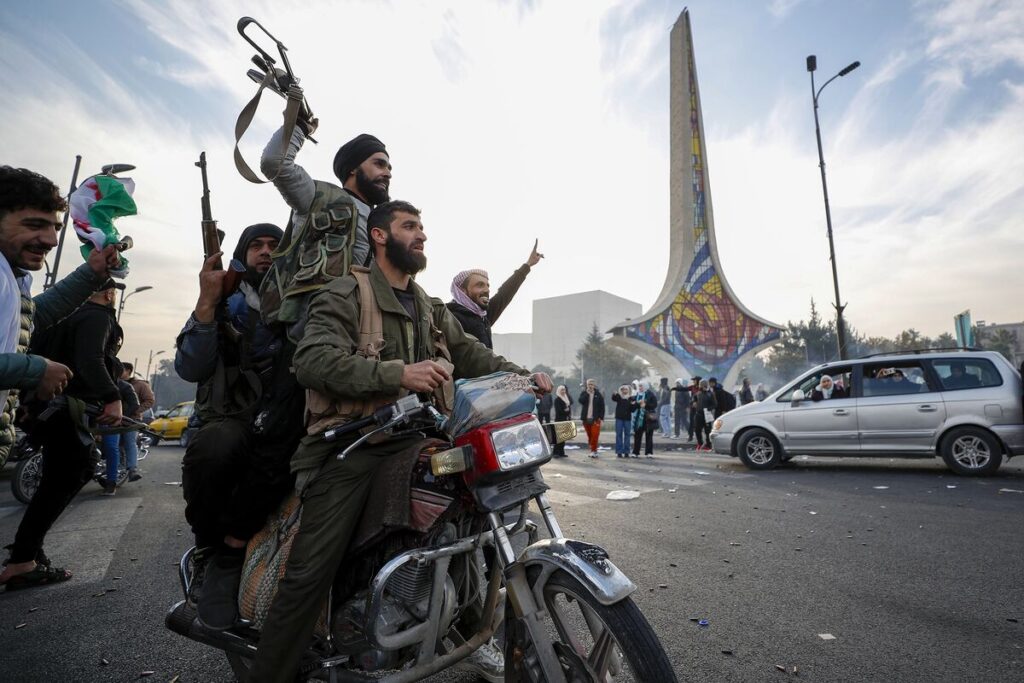
In December 2024, the Syrian civil war, which had been in a period of relative stasis, reignited when a coalition of jihadist rebel groups led by Hay’at Tahrir al-Sham (HTS), a rebranded offshoot of Al-Qaeda in Syria, launched a surprise offensive in northwest Syria. The insurgents advanced rapidly, facing zero resistance and seizing major cities such as Aleppo and Hama within two weeks before capturing Damascus. Initially, the fall of the Assad regime sparked cautious optimism among Syria’s diverse communities, but this quickly turned to fear as HTS imposed fundamentalist rule.
In response to this renewed jihadist offensive, the DAANES declared a state of “total mobilisation.” The SDF have faced coordinated attacks on power stations and vital infrastructure, prompting calls for unity among Kurds, Arabs, Syriacs, Assyrians, Armenians, and Circassians to defend their communities against both ISIS-aligned groups and Turkish military incursions.
In the meantime, Israel’s own military operations diverted Iran and Hezbollah’s focus, and together with Russia’s preoccupation with its war in Ukraine, created a power vacuum in Syria, which Turkish-backed forces have exploited. The timing of Turkey’s military offensive appeared strategic, aligning with the return of Donald Trump to the US presidency and shifting geopolitical priorities. With Iran and Russia facing their own challenges and uncertainty surrounding US policy under the new administration, Turkey positioned itself as a key beneficiary of the region’s shifting power balance.
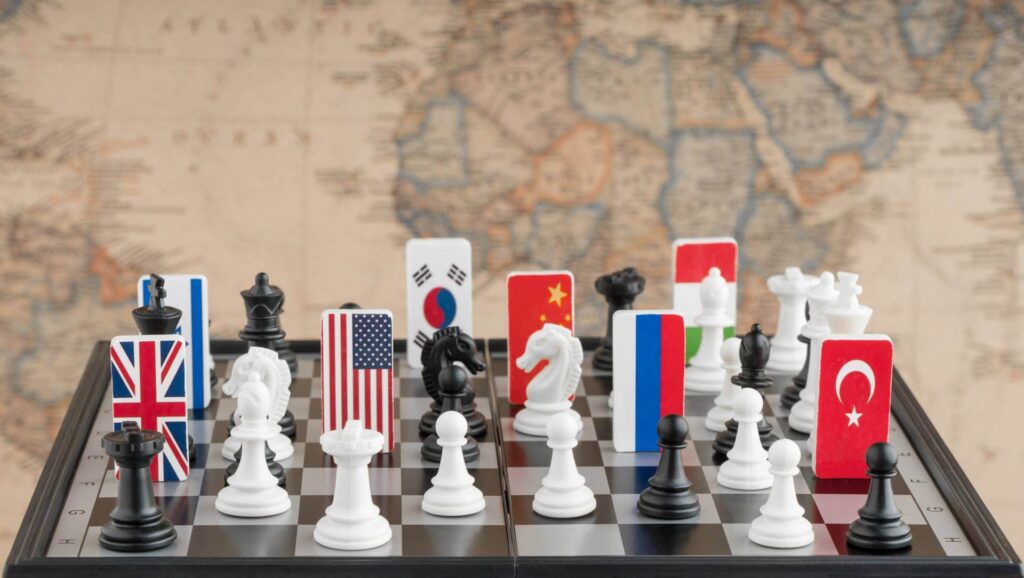
The diplomatic chessboard and Neo-Ottoman idealism
In this context, Israel’s ongoing destruction of Gaza and its expanded operations in Syria further demonstrate the alignment of regional power plays. Israel, backed by the US and UK, has used the crisis to bomb Syrian military infrastructure, ensuring that the new Syrian regime does not re-emerge as a regional threat. Netanyahu’s declaration that “The Golan Heights will remain forever under Israeli sovereignty” reflected Israel’s broader strategy—securing military and intelligence advantages while cutting off Hezbollah’s critical supply routes between Lebanon and Syria.
The future of Syria has been contested. HTS is putting forward a centralised authoritarian regime similar to Assad’s Ba’athist rule. In contrast, the Syrian Democratic Council (SDC), the political wing of the SDF, advocates for a federal democratic model based on decentralised governance and democratic confederalism. The SDC’s vision includes local autonomy for Kurds, Armenians, Assyrians, Druze, and other communities, fostering cooperation rather than sectarian rule.
The US administration faces a complex diplomatic challenge. It must continue supporting the Syrian Democratic Forces (SDF) in their fight against ISIS while simultaneously appeasing NATO ally Turkey, which has the second-largest military force in the alliance. Israel and France are pressing for the former scenario, while Erdogan wants the US troops to leave so that he can freely strike Rojava. A 2,000-strong US force remains stationed in Kobani, maintaining a red line that deters Turkey from launching a full-scale invasion. The SDF also retains its own leverage—holding tens of thousands of ISIS fighters and their families in the Al-Hol refugee camp and serving as the only force capable of containing ISIS’s resurgence.

Erdogan was threatening an imminent invasion while waiting for the Trump inauguration. A full-scale invasion did not happen, and the SDF forces have been successful in repelling the SNA attacks on the ground. However, the Kurds’ grave concern is based on the previous experience of Turkey’s invasion in Afrin in 2019, and the Erdogan regime’s Neo-Ottoman ambitions, with officials asserting that cities like Aleppo are “Turkish” and signalling broader territorial aspirations. While the US has threatened sanctions in response to potential Turkish aggression, past patterns suggest that Erdogan could proceed regardless, especially in the scenario of US troops’ withdrawal, escalating to one of the most brutal conflicts in the region since the height of ISIS’s rule.
Initially, Israel, Russia, and Saudi Arabia all had a strong interest in preventing the spread of HTS or the installation of a Turkish-backed government in Damascus. However, the overthrow of Bashar al-Assad and the rise of HTS leader Ahmed al-Sharaa as de facto and self-proclaimed president have altered regional dynamics. Saudi Arabia, which previously balanced clandestine support for various factions, is now engaging directly with Syria’s new leadership, signalling a shift toward stabilisation rather than proxy support.
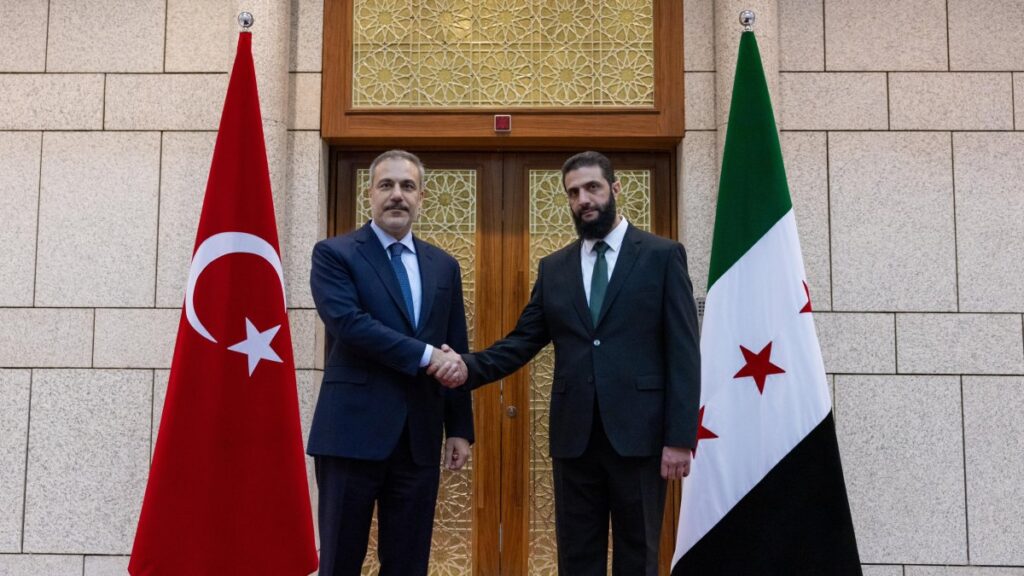
Meanwhile, Turkey remains deeply involved in shaping Syria’s future, continuing its backing of the SNA and working diplomatically with al-Sharaa’s government. The role of Israel remains ambiguous, but the likelihood of increased support for the Kurdish-dominated SDF from both Saudi Arabia and Israel remains, especially as the SDF seeks a decentralised and secular post-Assad Syria. Russia, however, faces challenges in navigating this new order, as open support for the SDF would provoke Iran and complicate its relations with Turkey.
With Assad’s removal two months ago, Syria’s conflict entered a new phase and a clear resolution appears to be distant. The country is divided along the lines of the SNA (Turkish-backed mercenaries and Sunni fundamentalists) and the SDF (multiethnic democratic forces with U.S. and possible Saudi and Israeli backing). Given that the U.S. and Turkey remain NATO allies, an open proxy war remains unlikely. Instead, Syria could face a long-term partition between these two factions, with the new regime attempting to navigate a fragile balance between Turkish, Saudi, and Western interests.
The pressure on the Kurdish-led forces to abandon their revolutionary aspirations will only grow in this environment, reinforcing the lesson that global movements have to unavoidably contend with the tension between capitalist state democracy and radical change.
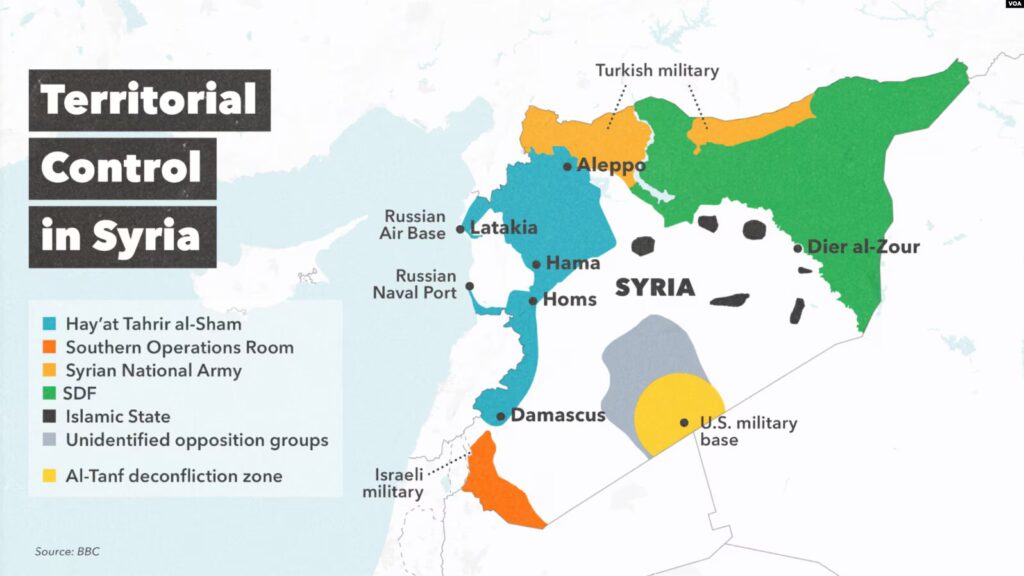
Negotiations between Damascus and SDF continues but it’s clear that any agreement is out of reach. With Trump in the White House and his calls for US forces to withdraw, Rojava’s autonomy is very uncertain. Other minorities in Syria are slowly being bent under the authority of the new centralised rule, as international states support and assist the new government to establish its power. Any revolutionary dreams of democratisation and federalisation of Syria fade away, as the new administration gets integrated into the ranks of capitalist nation-states.
The imperialist influence that Russia and Iran had over the Assad regime is being exchanged for the imperialist influence of Turkish Neo-Ottoman dreams, with support from Turkey’s NATO partners, which are western countries. The Islamic fundamentalist politics of the self-proclaimed president of Syria are now kept hidden, waiting to consolidate the power grip before starting any moves that could scare their newly acquired western partners. The promises of protection for ethnic minorities and women’s rights probably will only last until economic sanctions are lifted, but after that, nothing will remain between the new centralised state and any resistance against their authoritarian measures.
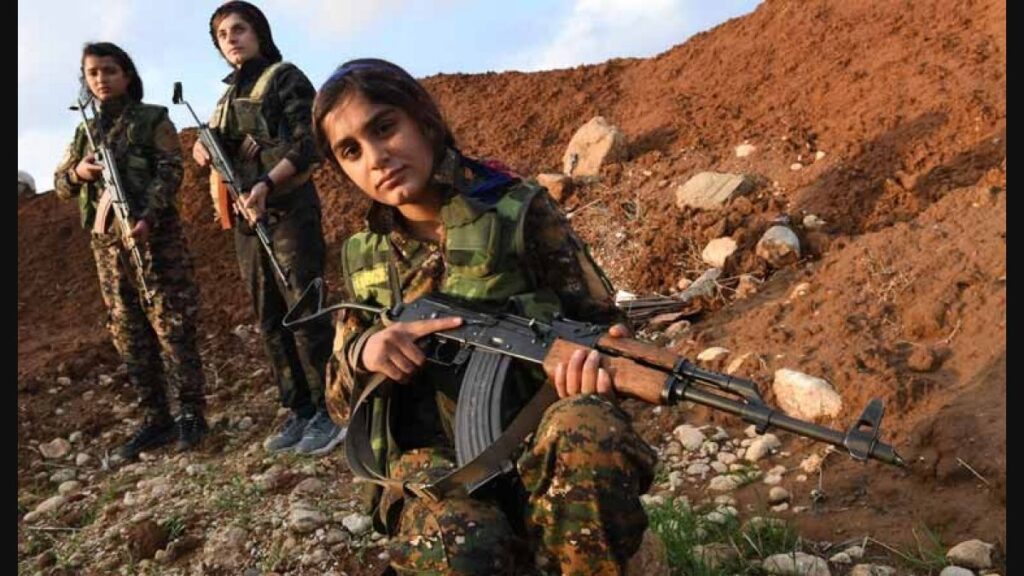
The revolution of Rojava is funnelled into a very difficult position, forced to accept the integration of SDF into a new Syrian state under the rule of an islamist force, or the annihilation under the bombs of the Turkish army. But after more than a decade of revolutionary developments in Syria, and more than four decades of efforts and struggle of the Kurdish Liberation Movement, a historic announcement by Abdullah Öcalan is expected on the 26th anniversary of his imprisonment. In the background, there have been diplomatic efforts to resolve the decades long Turkey-PKK conflict. A proposal for Öcalan’s release and a $14 billion development plan for Kurdish regions have been widely promoted in Turkey, in exchange for PKK disarmament. However, trust issues persist, especially with ongoing Turkish military strikes against PKK positions in Iraq and as Turkey views the U.S.-allied SDF as a PKK extension.

The Kurds have historically faced oppression from all states within whose borders they have lived. Unlike other minorities such as Armenian and Assyrian Christians, which the Assad regime allowed to preserve their languages, Kurds were forced to run schools in Arabic. PKK has been designated a terrorist organisation by Turkey, the US, the EU, and NATO allies. This includes the UK, which raided the Kurdish Community Centre in North London on November the 27th, the 46th anniversary of the PKK’s founding.
Turkey’s expansionism targeting the Kurds and other minorities echoes the atrocities of Ottoman-era ethnic cleansing. The Armenian genocide was carried out by the Ottoman Empire primarily between 1915 and 1916, and resulted in the systematic extermination of up to 1.5 million Armenians. The mass killings were carried out through death marches into the Syrian desert, resulting in widespread starvation, disease, executions, and the destruction of Armenian cultural and religious heritage. This played a key role in the ethnic and demographic changes that facilitated the emergence of modern Turkey in 1923.
In the autumn of 2023, following Azerbaijan’s military offensive supported by the Turkish government, nearly 120,000 Armenians were forcibly displaced from Nagorno-Karabakh, exacerbating the region’s long-standing ethnic conflicts. Entire communities were displaced and Armenian cultural heritage sites were destroyed, while the international community turned a blind eye. Netanyahu’s government in Israel was no doubt paying attention, and Erdogan must also be tempted to “cleanse” Rojava of Kurds if he believes the entire world will empower him to do so.
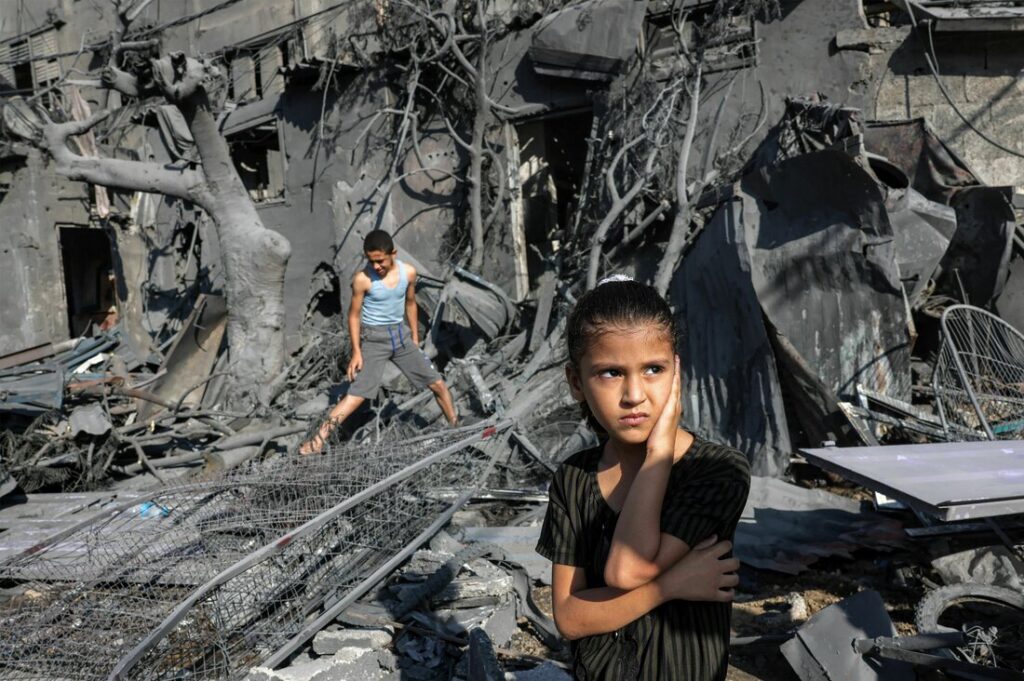
Brief update on the situation in the Palestinian territories
The situation in Gaza and the West Bank remains highly volatile, marked by significant political developments and ongoing military actions.
In early February 2025, U.S. President Donald Trump proposed a controversial plan to “take over” the Gaza Strip, suggesting the relocation of its Palestinian inhabitants to neighbouring countries like Egypt and Jordan. He described Gaza as a “demolition site” and envisioned transforming it into a luxurious destination, akin to the “Riviera of the Middle East.”
This proposal has been rejected by the Palestine leaders and was met with widespread condemnation from international organisations and various governments, with Amnesty International labelling the plan “appalling and unlawful”. In the West Bank, Israeli military operations have intensified, resulting in casualties among Palestinians.
The humanitarian situation in Gaza remains dire, as international organisations continue to call for immediate ceasefires and the provision of essential aid to alleviate the suffering of the Palestinian people.
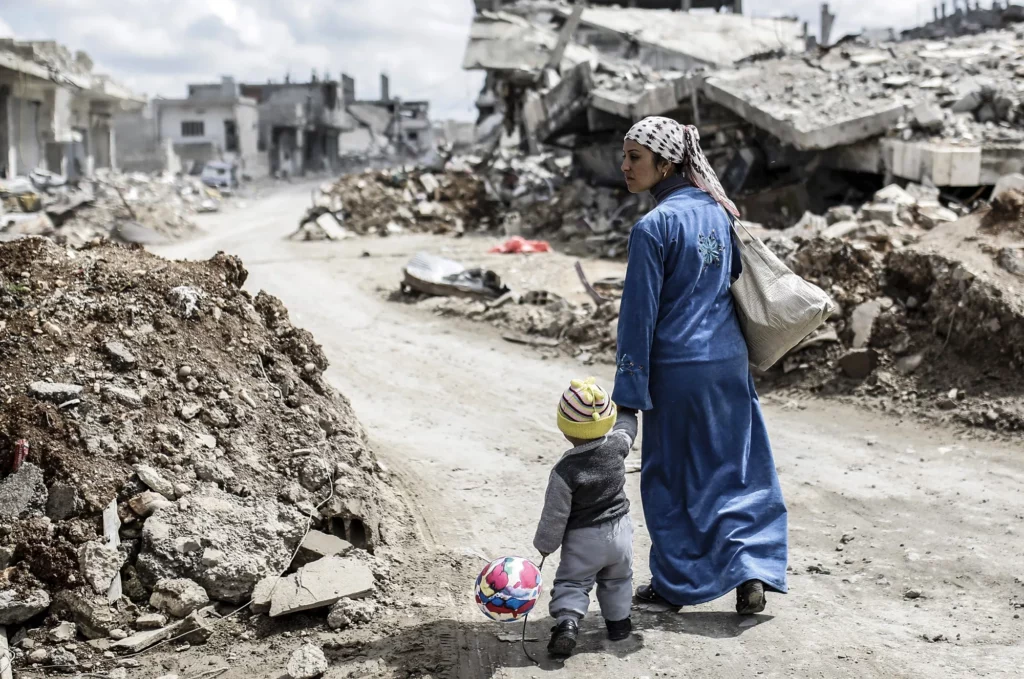
A war waged on the bodies of the weak and the marginalised
The proxy wars devastating the Middle East are driven by patriarchal and nationalist power struggles that prioritise capital and domination over freedom, diversity, and communal life. These conflicts have systematically erased historical memory, destroyed communities, and deepened cycles of division and hopelessness.
Nations and cultures predating modern state borders—such as the Armenians, Palestinians, and Kurds—have been repeatedly targeted for elimination when asserting their right to autonomy. Women, children, LGBTQIA+ individuals, and ethnic and religious minorities are treated as expendable, facing extreme violence and exploitation. The global system, dominated by hegemonic states, presents the marginalised with two options: assimilation or destruction.
In just one year, the devastation in Palestine has been staggering: since Hamas massacred 1,200 Israelis, Israel’s military onslaught has retaliated thirty-fold, with over 41,000 Palestinians killed, including 13,000 children and 115 infants born after October 7. More than 10,000 Gazans remain missing, buried under rubble. The entire population of Gaza—2.3 million people in an area smaller than 360 square kilometres—has been displaced, forced into extreme deprivation, and denied access to basic healthcare, food, and services.
83,000 tonnes of explosives have been dropped on Gaza, four times the explosive power used to obliterate Hiroshima and Nagasaki. Around 80% of homes in Gaza have been destroyed. It has systematically obliterated all universities, more than 70% of schools, 34 out of 36 hospitals, and countless other essential facilities: 165 health units, 137 ambulances, 611 mosques, all three churches, and 178 shelters in Gaza.
In Lebanon, over 2,000 people have died, and one million have been displaced. Another 600 Palestinians have been killed in the West Bank. Israel has lost an additional 350 soldiers in Gaza, and 200,000 Israelis have been forced to abandon their homes near Gaza and along the northern borders with Lebanon. Hezbollah rocket fire has killed around 50 Israeli soldiers and civilians.
In Syria, According to the Jineolojî Academy thousands of women and children have been raped since the civil war began, with at least 353,900 people killed since 2018. Another 56,900 are missing or presumed dead. Women and children make up 40% of the victims. Many Syrian women fleeing to Turkey, Lebanon, and Jordan have been forced into prostitution or sold into marriage under economic desperation. Non-binary and gender-nonconforming individuals face systematic violence due to rigid gender norms and the absence of legal protections.

Call for international solidarity
The developments in Syria highlight the broader consequences of US-led proxy wars, such as Israel’s campaigns in Gaza and Lebanon, and the ongoing Russia-Ukraine war. The current Middle East crisis unfolds within a global power shift, where key actors compete for influence amid economic strain, climate collapse, and growing instability. Warfare, which has been a persistent feature of the 21st century, has accelerated into a higher gear.
As financial crises and social unrest intensified in the last decades, ruling elites capitalised on rapid technological advancements and the lingering fear cultivated by the “War on Terror” to expand military budgets, surveillance, and repression. These resources were not deployed to ensure peace but to fuel ongoing conflicts, reinforcing a global restructuring process driven by militarisation and state violence.
In the meantime, the “Rojava Experiment” has reinvigorated the Kurdish movement across Kurdistan and in the exile communities of Europe, as well as inspired anti-authoritarian and anti-capitalist movements across the world.
The fighting people of Northeastern Syria are calling on allies worldwide to rise in solidarity. Their revolutionary project stands for autonomy, direct-democracy, feminism, and social ecology, challenging authoritarian regimes across the region. As drone strikes intensify and an invasion looms, grassroots action and international solidarity may prove to be crucial to deter another state-led ethnic cleansing in this tormented region.
_________
READ ALSO
- Zaher Baher, The experiment of West Kurdistan (Syrian Kurdistan) has proved that people can make changes (August 26, 2014, libcom.org) ↩︎
